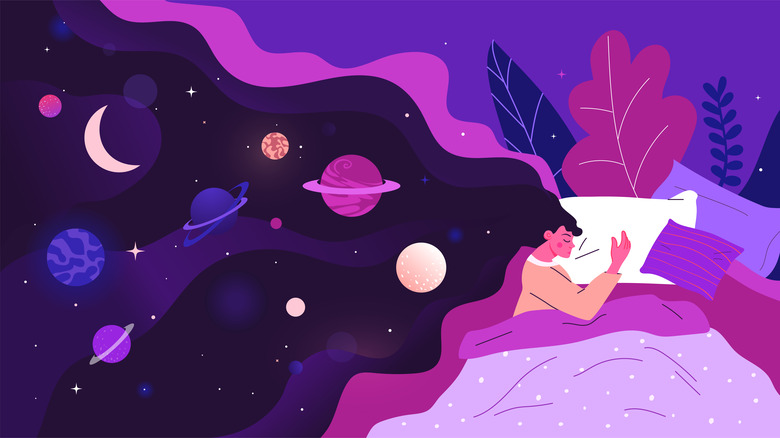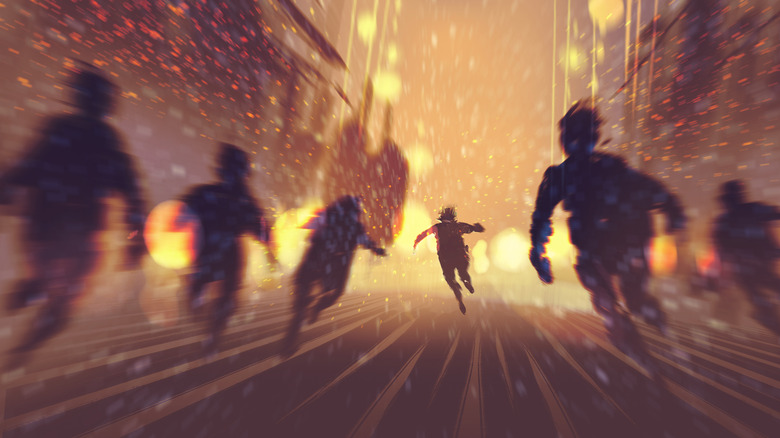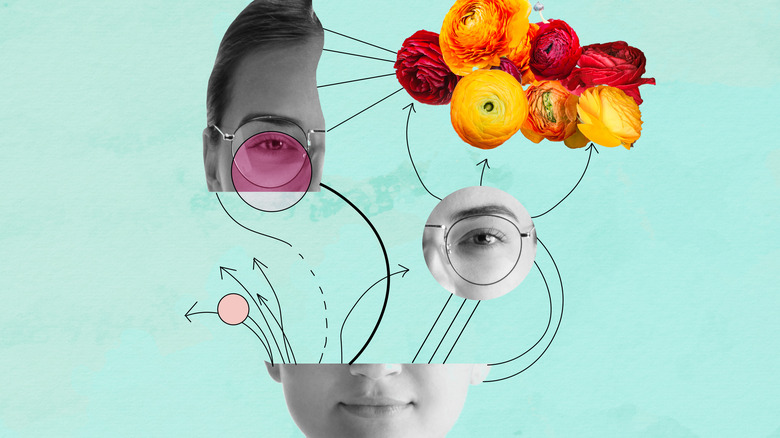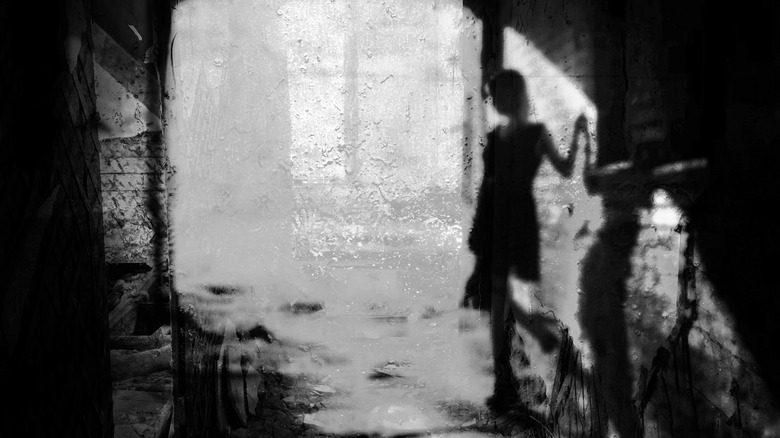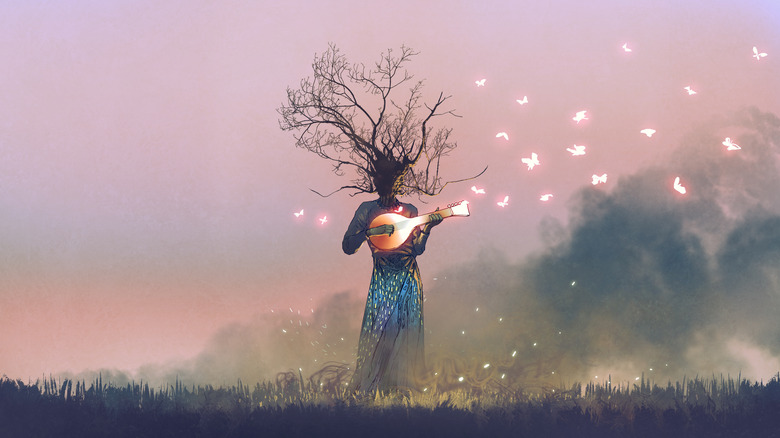Things You Can't Do In Your Dreams And Why
Sleep is a weird thing, and according to University of London psychology professor Christopher French (via Scientific American), no one's really sure why we have to do it. While there's been a lot of theories put forward, no one theory has been widely accepted. And dreams? Dreams are weird things, too. How else can we live out our wildest fantasies and deepest, darkest fears, all while leaving our physical bodies unguarded, unaware, and an easy snack for predators?
Albert Einstein College of Medicine psychologist and sleep medicine specialist Shelby Harris confirms (via Everyday Health) that yes, every single person dreams. Whether they remember those dreams or not varies, but most of us have woken up at one time or another and wondered what the weird things going on in our subconscious say about us as people.
Most have something else in common, too: There are some things that most if not all people are completely unable to do in dreams. Like what? That's what we're going to talk about, and it's entirely possible that you might not have even considered the fact that some major parts of waking life are suspiciously absent from your dreams. And that's odd, especially considering one of the running theories about dreams is that they're the brain's way of interpreting and organizing data — kind of like defragging a hard drive. But what's missing from our nighttime adventures ... and why? There are some fascinating theories.
Abducted by aliens? There won't be a smartphone handy to call home
While you might dream you turned your one-bedroom apartment into an ocean-going vehicle and you're getting ready to set sail with a miniature elephant and a talking dog, what you're not going to be able to do is check your favorite weather app before you head out. Why? Because the overwhelming majority of people don't dream about smartphones.
Psychology Today notes that a study of 16,000 dream reports found that smartphones showed up in only about 4% of dreams. That's weird, considering they've become such an omnipresent part of everyday life for most people.
Alice Robb is the author of "Why We Dream: The Transformative Power of Our Nightly Journey," and says (via The Cut) that a likely reason smartphones tend not to appear in our dreams is that they're a relatively recent invention. Dreams are primal and tap into a part of the human mind that's pretty ancient. The "threat simulation hypothesis" is the theory that dreams are preparing us for dealing with life-threatening and stressful situations that we're confronted with in the real world. Cell phones are still too recent to find their place among the most basic of humankind's fears, but there is an exception. Robb adds that when cell phones do show up, it's often in the context of another critical human emotion, particularly grief. So ... maybe be grateful that phones are conspicuously absent from dreams.
At least you're less ticklish in dreams, so that's something
Some people are ticklish, some aren't. There are a few different theories about why being ticklish is even a thing, and they include the possibilities that it has something to do with the way we cement social bonds — particularly between parents and children — or the idea that it has something to do with the body's natural defense mechanisms. Interestingly, even with as little as we know about tickling, it's helping researchers learn things about dreams: Because even lucid dreamers can't tickle themselves.
In a study published in the journal Frontiers in Human Neuroscience, researchers worked with lucid dreamers — that is, people who were aware of the fact that they were dreaming, and could control their actions in dreams — to see if they could tickle themselves, or be tickled by other characters in their dreams. Not only did they find that the lucid dreamers couldn't tickle themselves, but other characters in their dreams couldn't either.
It sounds like a what-the-heck sort of thing to study, but it actually has fascinating implications. Researchers think that it suggests that when we're dreaming, we're still aware of our bodies and sensations while in the dream state and that there's a part of the brain that minimizes the degree to which we react to stimuli. Maybe that's a good thing that'll help you make it through the next nightmare where the demons show up to set the world on fire.
Read a book — or any other writing
So, here's something that might come as a bit of a shock: You don't read while dreaming. Not only does that mean you're not going to find yourself dreaming that you're back in high school and being forced to read still more Shakespeare, but it also applies to things like street signs, billboards, and advertisements. Anyone who says otherwise is lying.
According to Harvard University psychology professor Deirdre Barrett, Ph.D. (via Inverse), science knows no one's reading in dreams because the parts of the brain that are responsible for understanding and interpreting language have been found to be largely inactive during sleep cycles. That includes the areas that essentially allow us to make connections between words, meanings, and sentence structure. This inactivity in the language centers of the brain is also why most people don't dream of spoken language in the same way they experience in the waking world, either: We dream about words that are completely made up or sentences that don't make sense if we remember them when we wake up. That's essentially because our ability to process language is sleeping, too.
There are some exceptions to that, though. Research has also shown that the only group of people who can read consistently in dreams are poets, and the idea is that they have a less structured, more creative, more fluid relationship with language, which means they don't need the brainpower that the rest of the population does. Who'da thought?
Win a marathon ... or run from zombies
When was the last time you not only ran in a dream but actually ran fast? Running in dreams often involves that slow-motion, running-through-water feeling, even for people who run regularly during their waking life. That's why the Marathon Handbook asked a few experts why running fast in dreams rarely happened, and they had some interesting responses.
Certified USATF Level II Endurance Coach Jonathan Poston suggested that the sensation had something to do with the fact that when we're asleep, the brain is active but our muscles are paralyzed. That leads to a conflict in signals, which is interpreted as running slowly in the dream world. Clinical Psychologist Dr. Nancy B. Irwin adds that even though the brain is active, brain wave activity is slower than it is when we're awake, which could lead to the moving-through-water feeling.
That's where Adam Sinicki's theory picks up. He's a personal trainer known as The Bioneer, and he suggests that it has something to do with the fact that when we're dreaming, the brain is building the world and scenarios that unfold around us, as opposed to just processing information received from the outside world. He says that if we ran in our dreams, the brain simply wouldn't be able to keep up with the world-building, so we're slowed down to a speed that's compatible with the brain's RAM.
Create completely original faces ... maybe
So here's a question: You dream you're on-stage, front and center, performing at a rock concert. There's a sea of people in front of you. Have you seen all of the people somewhere before, in real life? Going one step further: Is it possible for our dreaming minds to make up a completely original face, or are they all people we've seen before?
The Wu Tsai Neurosciences Institute at Stanford University took a crack at answering that, and after noting that it's next to impossible to test in a scientific way, said there are some things that we do know about the way the brain works that might help us understand who the people in our dreams are. Because one of the most important things that happens to the brain at night is the consolidation of memories and the movement of information from short-term to long-term storage, it's believed that the faces that populate the dreamscape are plucked from the real world — even if it's just a face that was glimpsed in a crowd, or seen sitting in a neighboring car at a stoplight.
It's also believed that while the brain is capable of piecing elements of faces together to create a new-ish face, those elements came from somewhere in the real world. And that brings up another question: If we can only dream about facial elements drawn from the real world, what does that imply about the monsters that we dream of?
Experience things in real-time
Let's say (perhaps optimistically) that a person gets a solid eight hours of sleep a night. Still, they may wake up remembering a dream where they only briefly chatted with Christopher Walken at McDonald's. The events of those dreams definitely didn't play out over the course of an entire REM cycle of dreaming sleep. So ... what gives?
It turns out that a University of Bern researcher named Daniel Erlacher figured out how to measure the amount of time it takes to do certain tasks in dreams. After mapping the way the brain processed certain activities — say, walking a certain number of steps — lucid dreamers were asked to perform that same activity in their dreams. Then, dreamers were able to move their eyes as they slept, indicating to researchers how long they dreamt it took them. (Pretty cool, right?) Even though they later said it felt like they were doing things in real, waking-world time, dream tasks always took longer to complete than real-world ones.
Erlacher said (via the BBC) his findings suggest we just can't experience real-world time in dreams (despite what it feels like in the dream). They also suggest that the difference in processing time might mean that if we were to learn to practice repetitive things — like, say, playing the piano — in our dreams, it would turn into real results in the waking world because of the neural pathways forged and cemented in dreams.
Smell that dead, decaying, bloated body
So, you're off to dreamland. You're walking down a beautiful, white sandy beach when you see something looming on the horizon. You get closer, and you see that it's the rotting corpse of some sea monster, dragged up from the depths of the ocean. You think it's rotting, at least, until one eye opens ... And this is about the time you should be grateful that for as terrible as the dream might be, the vast majority of people don't have a sense of smell in their dreams.
That's not to say it's not possible: According to the BBC, some people are capable of experiencing scents in their dreams, but those are usually people who have a very, very strong sense of smell in the waking world or have a job that involves smell (like making perfumes and colognes). Those people are few and far between, and most of us have dreams that are blissfully scent-free.
Interestingly, research has also been done investigating the impact smell has on shaping our dreams. When researchers from the University of Dresden's Smell and Taste Clinic exposed sleeping volunteers to either horrible smells or pleasant ones and then asked them to report their dreams, they found that pleasant smells led to more pleasant dreams. That said, the smells didn't actually appear in the dreams, and it suggests that for most people, the brain just has more important things to do when it's in a dreaming state.
The soundtrack of your dreams? Not likely (unless you're a musician)
Ever had a dream about being at a concert, or a party, and then woken up remembering all the details except the music you heard? According to Boston University School of Medicine Associate Professor of Neurology Patrick McNamara, Ph.D. (via Psychology Today), that's pretty normal: Most people simply don't — or can't — dream of music.
It's not entirely clear why, but McNamara puts forward a theory that's both fascinating and kind of terrifying. Since sleep — and dreaming — is a time when memories are transferred from short-term storage to long-term, he suggests that the brain views music — particularly with a chorus, repeating phases, and catchy melodies — as "parasitic," and prevents it from showing up in dreams and being transferred to a long-storage part of memory. He further suggests that this might be the brain's way of safeguarding itself from getting not an earworm, but a brainworm: Just imagine if "Rock Lobster" showed up in a dream and was moved to a place in your brain where it never, ever went away? (Let's take a moment and thank our brains for having our backs. Thanks, brain!)
There are exceptions to this, though, and most of the people who have reported experiencing music in dreams are musicians. For someone with a livelihood based on music, it isn't a background component of life as it is for many others, meaning the brain recognizes and acknowledges it differently — even in dreams.
